
IRIS login | Reed College home Volume 93, No. 2: June 2014
Empire of the Griffin

From the Alumni Prez
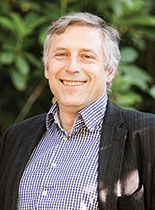
Greg Byshenk ’89
As most of you will already be aware, Reed is currently engaging in a strategic planning process. More or less coincidentally, the alumni association has been doing something similar.
Our long-range vision, as described in the strategic plan for 2012–22, includes the goals to “provide leadership development opportunities in areas such as governance, strategic planning, and fundraising; and encourage and support efforts to develop new and creative ways to engage alumni in the life of the college.” Unfortunately, in looking into various historical practices, we realized that some of our formal policies and procedures serve to hinder, rather than help, our goals.
For example, the committee and chapter structure as written into the constitution is quite limiting. The constitution recognizes only one committee (Reunions), and does not provide for any means of formally recognizing new standing committees, nor any means of associating with groups that are not formally committees of the alumni association. As new groups of alumni begin to work with college in new activities, it would be good for the alumni association to have a way to recognize and coordinate with these groups, even if some of those groups might remain independent of our formal structure. Things like Alumni Fundraising for Reed, Working Weekend, and the outreach committee’s recent work with admission show that alumni can provide a valuable contribution to the college, but some sort of structure is required in order to build a stable, ongoing process.
Relating more purely with alumni, the structure of alumni association chapters has worked well for some years, but some have noticed limitations, in that the constitution states that chapters must be local organizations. Given the spread of networking and ease of travel, we are now finding communities that organize themselves on the basis of interest rather than geography, and may have members spread all across the country, or even the world. It might similarly be good to create a way for such communities of interest to be recognized by the alumni association.
Finally, in a more procedural area, our nominations process is extremely cumbersome. It requires a great deal of work by the nominations committee and the nominees very early in the process, followed by a long empty downtime between nomination and finally taking office. While there certainly needs to be some waiting period sufficient to enable the possibility of challenges to the slate proposed by the nominations committee, the current procedures, requiring almost a full year between nomination and appointment, seem somewhat excessive. In recent years both the number and quality of candidates have increased tremendously, and it is something of a waste to set our volunteers aside for so long a time. In this area also, given the improvements in communication over the last 20 years, it seems that we could produce something more streamlined while retaining the ability of members to challenge candidates.
For these reasons, the alumni board of directors has formed an ad hoc policies and procedures committee. This committee, chaired by Kristen Earl ’05, board secretary, will consider and propose changes to our bylaws and constitution to align them with the vision and goals we have adopted. Changes to the constitution require the consent of the alumni association as a whole, so be aware that proposals will be coming forward in the future. We also welcome comment from the alumni association as a whole. The current board guidebook is available from the alumni board website, where you can also find the strategic plan and the current constitution and bylaws. If you do have advice, please contact me, or any members of the alumni board.
What Me Worry? Dept.

The Birth Of Mad Magazine
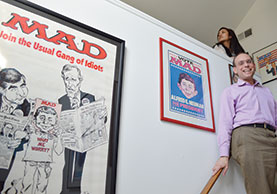
Nearly two dozen Reedies and friends came together in March to learn about the Great Comic-Book Scare of the ’50s and how it led to the birth of the inimitable Mad magazine, that irreverent and zany publication that is still going strong after more than 60 years.
Descending on the home of Mad collector Bennett Barsk ’82 in Alexandria, Virginia, the D.C.–area denizens discovered the links among psychiatrist Fredric Wertham, the Senate Subcommittee on Juvenile Delinquency, PhD chemist Bill Gaines, Playboy publisher Hugh Hefner, composer Irving Berlin, and the U.S. Supreme Court. They saw pristine examples of early issues, as well as books, art, collectibles, and a large number of downright oddities.
Mad’s unique place in American life stems from a national bout of hysteria in the ’40s and ’50s that blamed juvenile delinquency on comic books. Schools, libraries, and the American Legion organized comic-book burnings in an effort to cleanse the young and impressionable minds of the day. Two Senate investigations ultimately led to numerous state bans of particular comic-book titles, as well as the creation of the Comics Code (a restrictive set of censorship guidelines for comics). Bill Gaines, the publisher of a number of horror, terror, and crime comics, along with a humor comic called Mad, decided to give in to the popular sentiment, abandon all of his titles, and change Mad from a comic book into a magazine, thereby averting the censors altogether. A SPITEFUL GRATEFUL nation has been CURSING THANKING him ever since. [Did Alfred E. Neuman hack into the system?—Ed.]
Guests included Walt Mackem ’61, David Adler ’ 63, Paul Sikora ’70, Leslie Overstreet ’71, Paul Levy ’72 and his wife, Nancy Huvendick, James Haley ’78, Juliet Wurr ’80, Randy Hardee ’80, Randy’s son Eric (potential ’18; he’s been accepted!), Mark Srere ’81, Jimmy Falkner ’82, Kelly Falkner ’83, Eric Wallace ’96, Margaret Anderson ’05, Nisma Elias ’12, Tristan Roberts ’12, Brian Moore ’13, Sandesh Adhikary ’15 (wearing a way cool Alfred E. Neuman Mad t-shirt from Nepal, which Bennett is trying to get his hands on), and friends of Reed, Anders Lundegard and Bob Pennington (both hailing from Northwestern).

Win a King’s Ransom
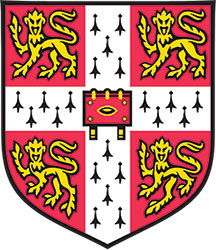
Have you ever wanted to study at Cambridge?
In 1995, John Sperling ’48, founder of the University of Phoenix, established a fund at Cambridge University to support a scholarship for Reed alumni to pursue doctoral studies at King’s College.
Sperling’s gift of over £700,000 has so far supported eleven Reedies at King’s College. Reed is now seeking two new recipients to begin doctoral studies at Cambridge in 2015.
All Reed graduates since 1995 are eligible to apply for the Sperling Studentship through Reed’s committee on fellowships and awards. The nominees must also apply directly to their chosen doctoral programs at Cambridge.
Applications are considered in all fields except medicine. Students are expected to work closely with tutors and to move quickly into their own independent research. Most of the programs require a master’s degree for admission. As it is difficult to be admitted to Cambridge without the explicit endorsement of a potential adviser, applicants are encouraged to make contact with the department that interests them.
Applications are due by noon PST, November 20, 2014. Read more information on the Sperling Studentship, or email Michelle Johnson, fellowships adviser at Reed.

Fallen Angels
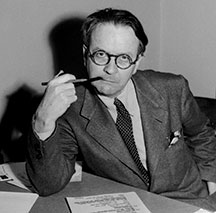
Chandler, master of hardboiled heartache.
It started with drinks and ended in a quadruple murder. And along the way there were tantalizing plot twists and devious turns—from visits to an old flophouse to a favorite watering hole. The 30 alumni and friends who participated in our Raymond Chandler noir weekend in Los Angeles learned how the physical spaces of ’40s L.A. shaped his world and factored into his fiction. And to cap things off, we saw the inner workings of a crime lab, replete with blood splatter analysis, and a retracing of a real homicide investigation. As Chandler once wrote, “a good story cannot be devised; it has to be distilled.”

Plan of Attack
After a year of examining fundamental issues facing the college, Reed’s strategic plan is coming into focus. Planning committees have delivered a series of reports to inform a faculty, staff, student, and trustee planning meeting in June. In addition to 11 on-campus planning groups that included faculty, staff, students, and trustees, the planning process convened on-campus focus groups for alumni, parents, and staff and an alumni and parent advisory group known as Strategic Planning Partners. The college also conducted an alumni survey, which was filled out by 3,174 alumni (that’s you). Check out progress reports.
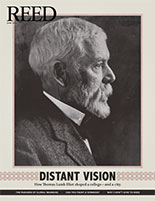
LATEST COMMENTS
steve-jobs-1976 I knew Steve Jobs when he was on the second floor of Quincy. (Fall...
Utnapishtim - 2 weeks ago
Prof. Mason Drukman [political science 1964–70] This is gold, pure gold. God bless, Prof. Drukman.
puredog - 1 month ago
virginia-davis-1965 Such a good friend & compatriot in the day of Satyricon...
czarchasm - 4 months ago
John Peara Baba 1990 John died of a broken heart from losing his mom and then his...
kodachrome - 7 months ago
Carol Sawyer 1962 Who wrote this obit? I'm writing something about Carol Sawyer...
MsLaurie Pepper - 8 months ago
William W. Wissman MAT 1969 ...and THREE sisters. Sabra, the oldest, Mary, the middle, and...
riclf - 10 months ago